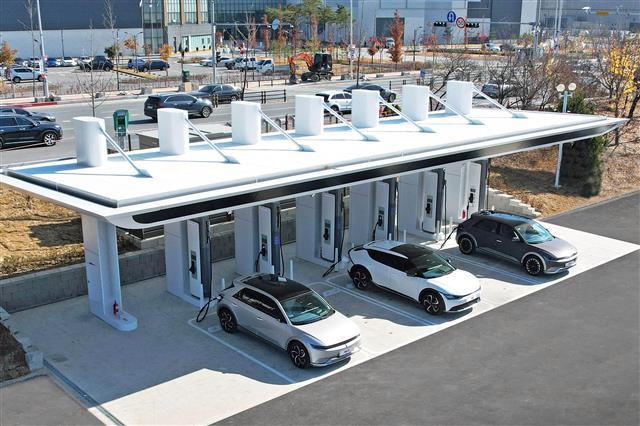Race for EV charging stations intensifies for market dominance
By Kim Da-solPublished : Nov. 30, 2021 - 16:33

Amid the global transition to electric vehicles, EV makers are moving fast to set up charging infrastructure in Korea not only to increase their sales but to gain dominance in a country where a no clear market leader has surfaced yet.
For automakers, building recharging points, which are still in the nascent stage here in terms of both numbers and maintenance, has become pivotal to overcome EVs’ general and biggest weakness –- a short driving range.
According to the government data, there were some 70,000 EV chargers including 54,000 slow chargers for 17,7000 EVs that run in the country as of June.
Market insiders viewed that for automakers, a fierce race to build dense EV charging infrastructure will decide who takes the lead in the local EV market.
According to the industry, Tesla, which runs around 184,000 charging stations in the US, owns some 55 percent of market share when it comes to high-speed chargers. It currently operates around 30 charging stations in Korea.
In Korea, setting up EV charging access has been mainly led by the government due to low profitability for companies as the demand is still not high.
But in February, the government released a plan to allow companies to set up fast charging stations on land that owned by the public institutions.
Authorities said they also consider additionally installing EV chargers at all of the around 12,000 gas stations across the country.
The country’s largest automaker Hyundai Motor Group has been operating 12 high speed charging stations called E-Pit. Hyundai Motor’s Ioniq 5 and Kia EV6 models can be charged up to 80 percent in 18 minutes at the stations.
Earlier this week, the Korean automaker opened a new E-Pit in Daejeon, filled with four 260kW super-fast chargers and two 100 kW fast chargers. EVs from other brands that use DC Combo 1 type can be charged here as well.
Meanwhile, foreign car brands have been also accelerating setting up EV charging infrastructure along with price competitive benefits.
Volkswagen Group, which owns Audi, Volkswagen and Porsche under its wing, has unveiled a plan that by the year-end, it would set up EV charging stations where its brand users can receive an up to 30 percent discount. The chargers will also be open to EVs from other brands.
The group said it would open 500 charging stations by 2025 across Korea that offer both slow and fast chargers.
Porsche Korea, which shipped the second highest number of pure EVs in Korea as an imported carmaker last year, has built 100 slow chargers out of 250 planned for installation by 2025.
“Expanding the number of fast chargers for EVs not only costs a lot of money -- about 20 times more expensive than slow chargers -- but installation is also very complicated technically. Despite such hurdles, the automakers setting up EV charging access first will be closely related to the number of sales because they’re inseparable,” said Choi Woong-chul, professor of automotive engineering from Kookmin University.
For automakers, building recharging points, which are still in the nascent stage here in terms of both numbers and maintenance, has become pivotal to overcome EVs’ general and biggest weakness –- a short driving range.
According to the government data, there were some 70,000 EV chargers including 54,000 slow chargers for 17,7000 EVs that run in the country as of June.
Market insiders viewed that for automakers, a fierce race to build dense EV charging infrastructure will decide who takes the lead in the local EV market.
According to the industry, Tesla, which runs around 184,000 charging stations in the US, owns some 55 percent of market share when it comes to high-speed chargers. It currently operates around 30 charging stations in Korea.
In Korea, setting up EV charging access has been mainly led by the government due to low profitability for companies as the demand is still not high.
But in February, the government released a plan to allow companies to set up fast charging stations on land that owned by the public institutions.
Authorities said they also consider additionally installing EV chargers at all of the around 12,000 gas stations across the country.
The country’s largest automaker Hyundai Motor Group has been operating 12 high speed charging stations called E-Pit. Hyundai Motor’s Ioniq 5 and Kia EV6 models can be charged up to 80 percent in 18 minutes at the stations.
Earlier this week, the Korean automaker opened a new E-Pit in Daejeon, filled with four 260kW super-fast chargers and two 100 kW fast chargers. EVs from other brands that use DC Combo 1 type can be charged here as well.
Meanwhile, foreign car brands have been also accelerating setting up EV charging infrastructure along with price competitive benefits.
Volkswagen Group, which owns Audi, Volkswagen and Porsche under its wing, has unveiled a plan that by the year-end, it would set up EV charging stations where its brand users can receive an up to 30 percent discount. The chargers will also be open to EVs from other brands.
The group said it would open 500 charging stations by 2025 across Korea that offer both slow and fast chargers.
Porsche Korea, which shipped the second highest number of pure EVs in Korea as an imported carmaker last year, has built 100 slow chargers out of 250 planned for installation by 2025.
“Expanding the number of fast chargers for EVs not only costs a lot of money -- about 20 times more expensive than slow chargers -- but installation is also very complicated technically. Despite such hurdles, the automakers setting up EV charging access first will be closely related to the number of sales because they’re inseparable,” said Choi Woong-chul, professor of automotive engineering from Kookmin University.




![[Herald Interview] 'Amid aging population, Korea to invite more young professionals from overseas'](http://res.heraldm.com/phpwas/restmb_idxmake.php?idx=644&simg=/content/image/2024/04/24/20240424050844_0.jpg&u=20240424200058)

![[Pressure points] Leggings in public: Fashion statement or social faux pas?](http://res.heraldm.com/phpwas/restmb_idxmake.php?idx=644&simg=/content/image/2024/04/23/20240423050669_0.jpg&u=)













